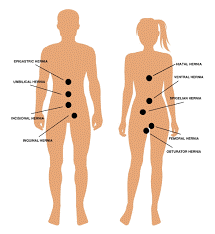Hernia Awareness Month

According to the National Center for Health Statistics, over five million people in the United States suffer from hernias annually. Of these five million, only 15% seek out medical treatment to resolve their diagnosis. Many hernias are not life-threatening however, if left untreated the condition can worsen thus requiring complicated procedures to correct.
What is a hernia?
A hernia occurs when an organ or fatty tissue bulges through a weak area or an opening in a muscle or tissue where the organ is located. Many contributors can cause a hernia to develop such as smoking, obesity, lifting heavy objects, as well as chronic coughing. As one ages hernias can also develop because of muscle wear and tear.
Common Hernia Symptoms
- Visible bulge or lump
- Pressure in area of concern
- Dull to sharp pain
- Pain that worsens with activity
Types of Hernias
Congenital diaphragmatic hernia – A serious birth defect that takes place during fetal development when the diaphragm is unable to close entirely. This can lead the abdominal organs to slide into the chest cavity while organs continue to grow.
Femoral hernia – A less common hernia that occurs when part of your bowel or fatty tissue pokes through into the groin, located at the top of the inner thigh area.
Hiatal hernia – This is a condition where an opening in the diaphragm allows the upper part of the stomach to push through into the chest cavity.
Incisional hernia – A common side effect of abdominal surgery, incisional hernias occur when tissue protrudes through a prior incision within the abdominal wall that has been weak over time.
Inguinal hernia – This is the most common type of hernia. It occurs when part of the bowel protrudes into the inguinal canal.
Perineal hernia – This rare type of hernia takes place when tissue or organs can push through weakness or an opening within one’s pelvic floor into the abdominal cavity.
Umbilical hernia – Mostly congenital, these types of hernias occur when part of the intestines can poke through an opening in the abdominal wall near the belly button.
If you suspect you have a hernia, schedule an appointment a primary care provider or urologist. To find a doctor near you visit www.mountainsidehosp.com/find-physician.




